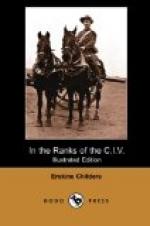(Midday.)—The convoy is closing up and getting into a sort of square. We have changed positions several times. Shells have fallen pretty close, but have done no damage. Some of them burst, others only raise a cloud of dust. We are already getting used to them, but the first that fell made us all very silent, and me, at any rate, very uncomfortable. Later we relieved ourselves by a rather overstrained interest in their probable direction and point of impact. We were standing waiting, of course, with no excitement to distract our minds.
(2 P.M.)—A curious feature in the scene is the presence of veldt fires all over the place, long lines of dry grass blazing. Possibly the Boers start them to hide their movements. The Boers evidently want this convoy; they are right round our rear and on both flanks; all our troops are engaged. The convoy is being moved on, and my section is left as rear-guard. The smoke of burning grass has blotted out the sun, and it is cold. The sun is a red ball, as on a foggy day in London. Shells have ceased to fall here, but a hill on the left is being heavily shelled by the enemy, and the infantry on it are in retreat.
(4 P.M.)—We are slowly getting on, covering the convoy’s rear, the enemy pressing hard. Our guns are now firing over our dismounted troops. Williams has just ridden up. He has been orderly to the Captain; a shell fell just by his horse without bursting. I have been fearfully sleepy, and have snatched a few minutes of oblivion, during halts, on the ground by my horses, who are as tired as I am, poor beasts.
(Written later.)—The Boers, as it seemed to me (but what does one know?), had us in a very tight place, but they never pressed home their attack, and the convoy was rushed through the remaining seven miles to Lindley. We covered its retirement till dark, and then followed it with all speed. I shan’t forget those seven miles. They included the worst drifts of the whole journey, and getting up and down them in pitch-dark was unpleasant work and a pretty severe test of driving. Three mule-waggons of the convoy had to be abandoned at one place, but the rest of it reached Lindley safely, as did we. It was rather like making a port after a storm when the lights appeared and a bugle blowing “first post” was heard. We passed some silent houses, groped into an open space, picketed horses, chucked off harness, and slept by it, dog-tired. We had hoped for a good night’s rest, but, the last thing, orders went round for reveille at four.
June 28.—It was icy cold at 4 A.M., and one’s fingers could hardly cope with straps and links. I had done one horse, when welcome orders came that my waggon was not wanted. So I sat by the cook’s fire and cooked in the lid of my mess-tin a slice of meat I had hastily hacked from an ox’s carcase at our last camp. Also some Maggi soup. About sunrise the limbers returned, having left the guns and gunners in position on a




